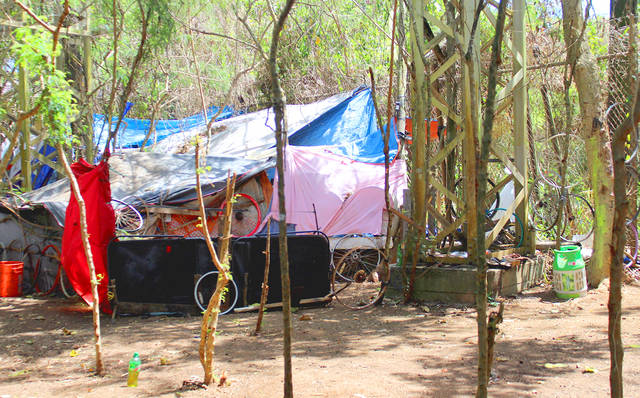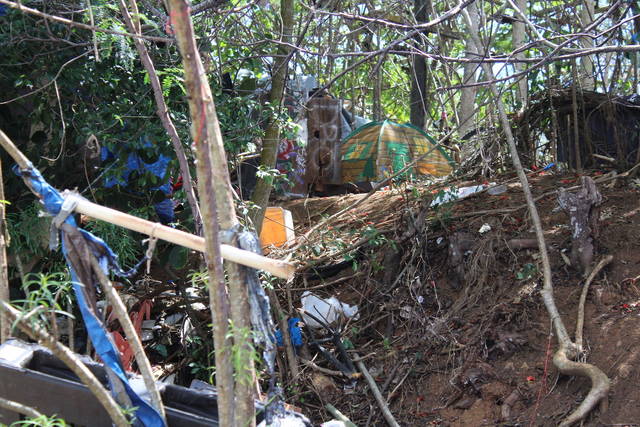LIHUE — If you ask the business owners at the Haleko Shops Complex what their biggest problem is right now, you might guess it revolves around the pressures involved with owning your own business.
But for Pat and Lisa Sullivan, owners of Kauai Business Services, one of their biggest problems right now is the tent city that stands in plain sight west of the complex near the Rice Street, Kaumualii Highway and Kuhio Highway intersection.
Lisa Sullivan shows the extent of the problem after she goes into her office and retrieves a plastic baggy containing what she believes to be a crack pipe. The baggy has the date “Feb. 1, 2019,” written on it. It’s the day the Sullivans found it in front of their business. The clear glass smoking device is caked in residue on the business end. They say they have also found needles and feces before.
“As far as I know, there’s no plan for this,” Lisa Sullivan says with an ominous tone. “It’s just like we’re letting it go until something bad is going to have to happen.”
On Rice Street, just feet from the pedestrian sidewalk, a blue tarp sat until it was recently cleaned up. It served as a makeshift landfill the residents of the tent city are using to collect their garbage. It was in plain sight of the thousands of cars that pass the road everyday.
For people like Gayle, originally from Orange County, Calif., the tent city is her only option. She’s lived on Kauai for 23 years.
“The community needs to know that the rent is so high that people can’t afford to live anywhere, even if you have four jobs,” she said with a kitten walking around her feet. “They need to put a cap on the amount of rent people can charge for rentals that they have on all their properties.”
The Sullivans say they’ve had to call the police almost daily this year. It got to the point that Lisa Sullivan finally asked the police what moving the homeless camps from location to location accomplishes. She believes the problem itself needs to be addressed rather than the symptom of the problem.
Kauai has an estimated 400 to 500 homeless.
There were 38 incidents reported at Haleko Shops Complex from June 24, 2017 to Feb. 15, 2019, the county said. They ranged from burglary to trespassing to welfare checks to drug offenses.
If during the course of an investigation an officer determines that a subject is homeless, officers have been given referral handouts that contain information on shelters, food pantries and other referral services that they can share with those interested.
Behind the shopping complex there is an 8-foot chain-link fence that separates the business center property from the burgeoning tent city.
At one section of the fence, a cut has been made, creating an easy access route to the property of the shopping complex. The tent city is not on the property of the Haleko Shops Complex, but the fence serves as a property-line border, something that was recently installed to help alleviate the problem.
“It’s been an ongoing problem for about a year as far as I can recollect,” said one business owner who preferred not to be named. “Before it was worse. They would come here at night and before there was a bunch of people dealing with drugs. We would come to work in the morning and somebody had done a number two on the welcome mat.”
Inside the tent city, several smaller tents and bigger family tents stood in the afternoon sunshine in a communal fashion. There was a garden adorned with bicycle rims and a sign that reads “Private Property Authorized” resting between two palm fronds.
Garbage and empty liquor bottles line the perimeter of the city. Visiting the location three times in the day, there were no occupants during the first two visits during the day, but later in the evening there was activity.
At night the problem intensifies, according to the business owners who have dealt with this growing problem over the better part of the past year and a half.
The property the Haleko Shops Complex is on is owned by the The Harry and Jeanette Weinberg Foundation of Honolulu. The property the tent city is on is owned by an old mill trust, according to the Sullivans. They believe a number of the homeless are coming from Oahu and the mainland.
That sentiment is something Mayor Derek S.K. Kawakami also expressed in a recent interview with The Garden Island.
Kawakami addressed homelessness in his State of the County speech on March 14.
“We said we would open an Office of Human Concerns, and next month we will open the doors,” he said during the address. “The Office of Human Concerns, or Hale Kokua, is a co-location of existing county resources that empower those in our community who seek employment, housing or elderly assistance…or resources for mental health needs, suicide prevention…or to combat substance abuse.”
In the mayor’s budget, recently submitted to the County Council, the number two priority in the fiscal year 2020 budget is affordable housing.
Meanwhile, another night passes in the Haleko Shops Complex, and the owners of the five businesses say there continues to be problems that affect their businesses and customers. On the flip side, the residents of the tent city say they aren’t going anywhere.
“This woman was parked up here the other day… I walked up to her and I said, ‘I’m sorry, but we’re not open,’” Lisa Sullivan explained. “She said, ‘I just brought my son to find his father back there. He’s living back there. Can’t you show a little compassion?’”
•••
Ryan Collins, county reporter, can be reached at 245-0424 or rcollins@thegardenisland.com.







These druggies and bums need to be put on chain gangs to clean up garbage and cut weeds.
The more you subsidize a social problem (through welfare, homeless advocacy, etc.) the more of the problem you’ll have. Use the money to send them back to where they came from. Someone obviously sent them here.
“The property the tent city is on is owned by an old mill trust, according to the Sullivans.”
The owner of the “old mill” property should be cited for illegally using their property as a campground, regardless of whether or not they collect rent. The State Health department should investigate and cite the property owner for health violations.
Homeless people should be given an opportunity to move to an appropriate shelter, with reasonable care provisions. If they refuse, they should be taken to the airport and provided with a one-way ticket off island.
The government exists to serve all the people who follow the rules. It is time for the powers-that-be to get control of this situation of homeless on Kauai before it gets worse. Allowing tent cities like the one cited only serve to encourage more homeless to come to Kauai.
The mayor needs to fight this problem head on. Not just with words. This is not going away. It is getting worse. We can’t end up like Oahu with homeless lining the streets. It’s unsanitary and disgusting. These people need help. They either except the help, or go to jail. They are loitering on private property and leaving trash everywhere.
Kawakami, get on this. Don’t put this problem on the back burner for another time. You can see first hand what that does. Look at Oahu!
Any feedback on how the temporary shelters have helped the homeless situation on Oahu? If it’s working, would something like that work here in KI?
https://www.kitv.com/story/39351728/the-states-first-igloo-dome-shelters-open-to-help-hawaiis-homeless
It’s great to address the affordable housing crisis but that’s a long-term solution. What are the short-term goals & would something like the igloo-house development work here as a stepping stone to get people off the street who really want to better themselves?
Just like the illegals, trespassing is trespassing. Ship them back to mainland where they have a chance of surviving and getting ahead. Handouts are not the solution.
Part of the problem is the outrageous rents greedy owners are charging for slum housing on this island.
The article never mentioned where these people are going to the bathroom? I here that there is a “designated area”. This is a public health issue that needs to be addressed. When does the department of health intervene?
What you slumlords expect charging outrageously sky high rent on a island with mostly low paying jobs.. Duhhhhhhhhh
Reading all the comments I see some thoughtful discussion and some reactive comments. A balanced approach to the impacts of homelessness includes policies of enforcement and compassion. Create Ohana zones where existing services can be coordinated and enforce laws governing illegal activity. This has been done successfully in other places and is a best practice for illegal encampment mitigation.
I worked for a homeless nutrition program in Washington, D.C.. I learned there are wealthy “philanthropists” in cold cities around the country who buy homeless people one-way tickets to Florida, California and Hawaii so that they won’t freeze to death in the winter. There are also desperate people on the mainland who believe they will be able to “live off the land” in Hawaii, eating coconuts, bananas and mangoes, and fish. They buy a one-way ticket based on this naive belief. Some of these people have drug addiction or other mental conditions, and many have run out of options in their home towns because they have burned bridges with family and friends.
How many of Kauai’s homeless can be considered “homeless visitors?” On the other hand, how many grew up here and have suffered from personal or family tragedy that causes financial desperation? How many are hard-working Kauai families who simply need an affordable place to live? There are many different kinds of homeless people, and many different reasons for being homeless.
Kauai people are generally wonderful about treating others with respect and dignity, even for grown-ups who are unable to take care of themselves. We understand that all of them are fighting tough inner battles and need to be treated with as much kindness as possible. But there are limits to what any one of us can do. I hope the county council will make a task force to document every long-term Kauai “resident” who is homeless or at risk of homelessness. Like everyone I know on this beautiful island, I believe every Kauai resident should have an affordable, safe place to live. I also hope that every visitor has a good, safe experience here that allows them to feel healed and filled with aloha when they return home.
Well this is not encouraging. I was planning on moving there. My job is torture and my wife hates me, so I was going to give her everything except the cost of a ticket and a few extra bucks for a tent.